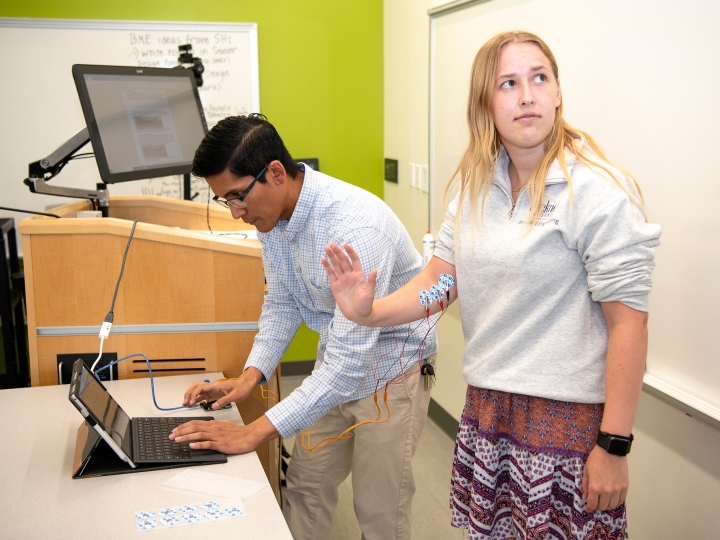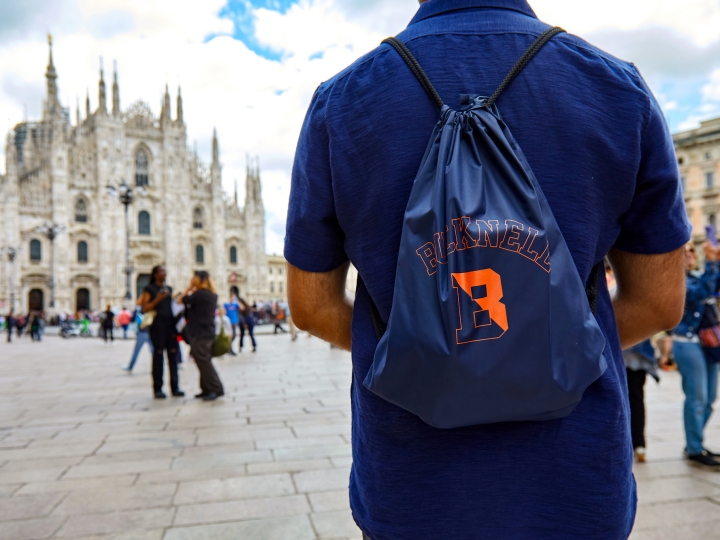Across Disciplines, Student and Faculty Researchers Seek STEM Role Models
April 30, 2018
When the only role models you're given are truly remarkable, standing at the very top of their fields, it can be hard to see yourself in their shoes.
It's an issue that has nagged Bucknell electrical & computer engineering professor Philip Asare, who grew up in Ghana, since his days as a college student in the U.S., when time and time again he was told to look to the Neil deGrasse Tysons of the the world for inspiration. It's also one that resonates with current Bucknell student Nir Aish '18, a managing for sustainability major from Tel Aviv, Israel, who knows how important role models have been for her.
Find Your Path
Together, these scholars from very different backgrounds have been taking on the problem, working since 2015 — the year that each came to Bucknell — on a study aimed at improving access to realistic role models for Bucknell STEM majors from underrepresented groups.
"The idea for the project came from Philip's experience as a STEM scholar from a minority background," Aish explained. "Telling students to look up to these very extraordinary individuals, whose stories of success you can't really replicate, kind of sets up students for failure, because the role models they have don't represent paths they can follow."
Aish, who began the research project from her first year through the Presidential Fellows Program, said the topic hit home because she has many role models — first and foremost her parents — and understands how critical the realistic path they've shown her has been for her success.
Others on campus and beyond have started taking notice of their work. In March, Aish, Asare and their fellow collaborator Professor Elif Miskioğlu, chemical engineering, were awarded best paper at the Institute of Electrical and Electronics Engineers Integrated STEM Education Conference, an international gathering known for featuring cutting-edge research and integrated approaches to the study of STEM disciplines.
Alumni Role Models
Aish's study began by querying non-white or Asian STEM students — both historically underrepresented groups — to identify their current role models and what qualities they admire in them. She then worked with the offices of Development & Alumni Relations to identify Bucknell alumni from the same backgrounds, and found that the students would be receptive to their hearing their stories.
"We recruited alumni because they were once in the shoes of our students," she said. "What was also great to find was that some students also saw themselves as role models, and saw that someone who fails and keeps going is someone to look up to."
Aish believes the project could lead to a new mentoring program that complements Bucknell's existing efforts aimed to recruit and retain a diverse student body in STEM subjects, such as the STEM Scholars program and the Engineering Success Alliance.
"Our research seeks to go one step further than just having diversity, but celebrating it, and providing the kind of support that provides that intrinsic motivation," Aish explained.
The Perfect Project for Bucknell
She also said the project is one that Bucknell — with its small size, diversity of academic programming and emphasis on interdisciplinary learning — is perfectly equipped to tackle.
"The support I've received says a lot about Bucknell as a community," Aish said. "When I talk about my research with individuals from different departments and colleges, they understand — they have that critical thinking and interdisciplinary mindset. They're also willing to contribute and help out, which shows their commitment to diversity."
The College of Engineering and Department of Electrical & Computer Engineering provided funding for the early stages of the project, she added, while the Registrar and Diversity, Equity & Inclusion offices helped identify student participants.
Aish will graduate a year early in May but plans to remain on campus through the summer, planning the study's next steps and establishing a path for the next presidential fellow who will take on the project. Having discovered a love for research at Bucknell, she hopes to continue her studies in graduate school in 2019, and is seeking an interdisciplinary program much as she found in this project.
"I'm so used to it from my time here and it makes so much sense," she said. "I developed my academic mindset at Bucknell."

